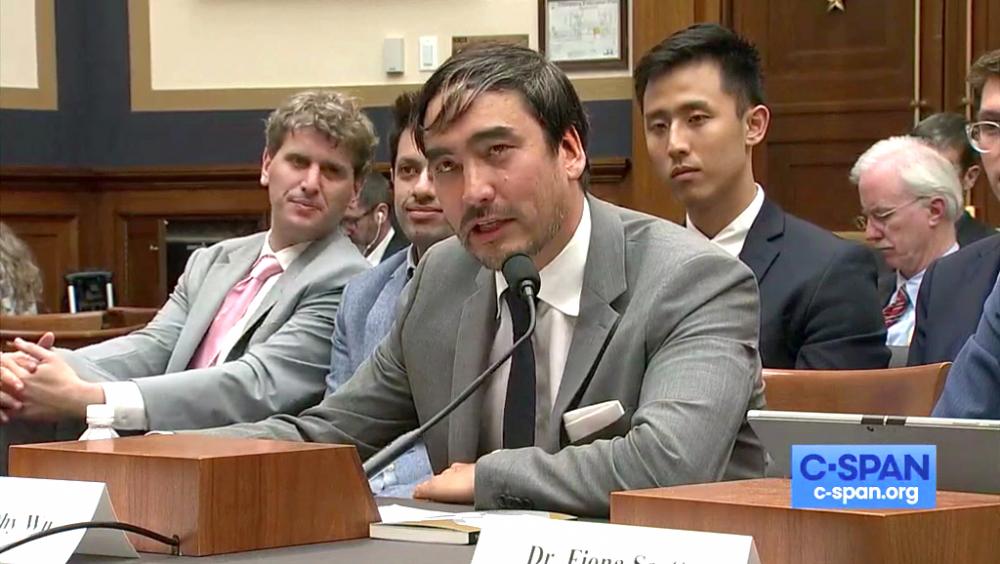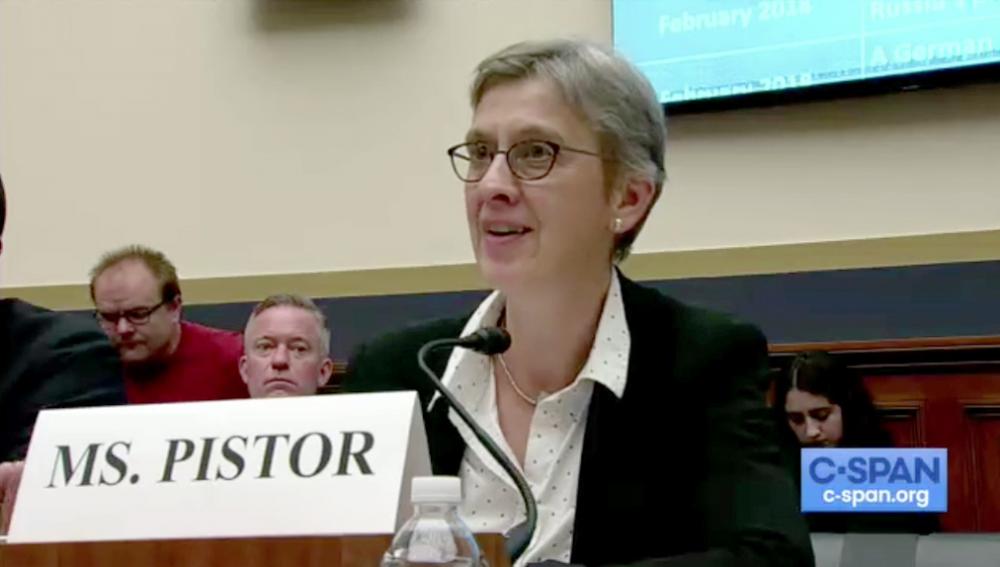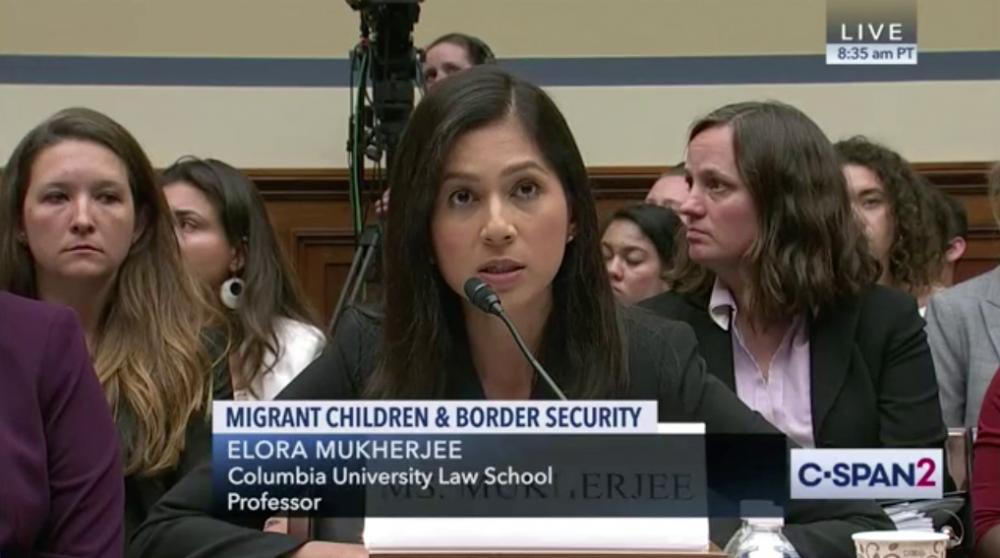Three Issues, Three Professors, Six Days
Law faculty testify to Congress on cryptocurrency, breaking up Facebook, and separating families at the southern border.
Diving into controversy, congressional committees turned to Columbia Law faculty for expert testimony on the size of technology companies including Amazon and Google, Facebook’s cryptocurrency proposal, and the plight of migrant children held in detention at the U.S.-Mexico border.
Three law professors—Elora Mukherjee, Katharina Pistor, and Tim Wu—appeared before House committee hearings within a six-day span.
“Columbia Law faculty are regularly called upon to provide expert commentary on major issues of the day, but three professors testifying before Congress within one week underscores Columbia Law School’s impact on the national dialogue,” says Gillian Lester, Dean and the Lucy G. Moses Professor of Law.
On July 16 Wu, the Julius Silver Professor of Law, Science and Technology, testified before the House Judiciary Committee’s antitrust subcommittee at a hearing focused on whether “big tech” companies Amazon, Apple, Facebook, and Google need breaking up to increase competition in online commerce. Columbia Law academic fellow Lina Khan, author of an influential article about antitrust law and Amazon, serves as majority counsel for the Subcommittee on Antitrust, Commercial and Administrative Law.
Wu, author of The Curse of Bigness: Antitrust in the New Gilded Age, said that the tech giants have begun to stifle startups and innovation. The United States should look to its own “incredibly successful policies” in antitrust and in procompetitive regulations that led to the breakups of AT&T and IBM and the resulting wave of innovation and startups, Wu argued.
Representatives of the four tech companies, who also testified at the hearing, said they face stiff competition for all the services they provide. Wu compared their comments to “a hearing from 2005. . . .[As if] I could leave this hearing, go to my garage, start a challenger to Facebook.
“Everybody knows that’s not true,” Wu told the panel. “There’s no question as to whether there are barriers to entry and whether the tech economies have, in fact, become a very difficult place for people to get started.”
As a result, the rate of business startups has declined, “which is almost unthinkable in the United States,” Wu said. “If the U.S. wants to be, in the next century, the tech leader, [the] preeminent power, it needs to understand our own legacy and the advantages of competitive innovation.”
‘Accountable Only to Themselves’
Facebook was also in the crosshairs at a House Financial Services Committee hearing July 17 focused on the company’s proposed cryptocurrency system, dubbed Libra and headquartered in Switzerland. Pistor, the Edwin B. Parker Professor of Comparative Law and director of the Center on Global Legal Transformation, told committee members that Libra and its governing body will fall outside existing regulatory control in the United States “or any other country, for that matter.”
At the same time, Facebook’s proposal to back Libra with a “reserve” of safe assets including bank deposits and government-issued debt means that Facebook will be “free-riding on a public safety net for which they are not paying, and extending the safety net to users around the globe,” Pistor said.
“This concentration of power is unmatched by any meaningful accountability to anyone,” Pistor told the committee. “The choice of the legal structure means the members of the Libra Association will be insulated from liability and accountable only to themselves.”
Meanwhile, government regulation will struggle to catch up, said Pistor, whose new book, The Code of Capital: How the Law Creates Wealth and Inequality, discusses how law and regulation create new property rights.
“The current level of transnational regulatory cooperation does not match the versatility of a private actor,” Pistor told the committee. As a result, Facebook’s cryptocurrency organization will be able to “pick and choose from legal systems around the globe which laws and regulations best suit its needs.”
‘Families Belong Together’
Mukherjee, the Jerome L. Greene Clinical Professor of Law and director of the Immigrants’ Rights Clinic, appeared before the House Oversight and Reform Committee July 12, less than a month after her firsthand reports on horrendous conditions of confinement for children in U.S. border detention stations sparked national and international media coverage. Since then, Congress has approved a $4.6 billion emergency package for humanitarian aid at the southern border, and a federal court ordered medical experts be allowed into detention centers and gave Customs and Border Protection two weeks to improve conditions there.
Mukherjee described children—including babies without diapers—suffering from lice and the flu, wearing the same filthy clothes for weeks, and feeling frantic with fear for the family members they had been taken from.
“I was and I remain shaken to my core by what I witnessed at Clint,” Mukherjee testified. “I do not have the words to explain to them [my own children] what is happening to children their age in America right now. Families belong together, children should be free and with their loved ones. That is what is required by our Constitution, by our federal laws, and by our basic humanity.”
Mukherjee told the congressional panel that policy, not budgets, caused the conditions she witnessed. “The problem here is not the lack of money. The Department of Homeland Security has enough money to provide every child with a toothbrush, with soap, and with a bed,” she said. “This is about cruelty and callous disregard for children’s well-being.”
Mukherjee has been at the center of legal efforts on behalf of detained migrant children since 2007. “I have never seen anything like this. I have been involved in suing three administrations [on behalf of asylum-seeking children] . . . but never before have I seen what I saw, heard, and smelled in Clint last month,” said Mukherjee. “What we saw was so appalling we had to share it with America. We had no other choice.”
# # #
Published on July 18, 2019


